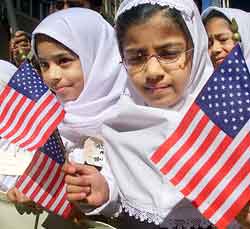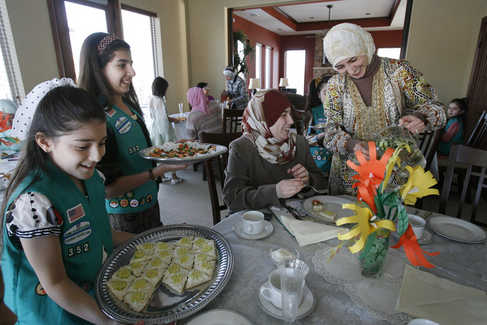Muslims In America Biography
Source:- Google.com.pkFor many, being Muslim in America today means having to face discrimination on a daily basis. In the year following the Sept. 11 attacks, officials reported that hate crimes against Muslim Americans increased by 1,700 percent. In the years since then, negative stereotyping and general hostility towards young Muslim men in particular has become a harrowing norm. Today’s Muslim Americans — many of whom were born and raised in this country — are routinely harassed by police, verbally assaulted by strangers and shunned by peers. Although they perceive themselves as American, they are seen as “the other.” Here are their stories.
Abdullah Ghuman, 19. Originally from Pakistan, Ghuman moved to Brooklyn when he was five and has been living there ever since. Two weeks ago, as he was coming home from college around 11 p.m., two NYPD officers stopped him, claiming he looked “suspicious.” When he told them he was just trying to get home, they began harassing him, calling him a “smart-ass” and insisting on searching him. “They told me to get up against the wall, checked my pockets, my wallet, they took everything out.” The search continued for 15 minutes, until the two officers finally let him go.
Mohamed Albana, 22. He was born in New Jersey to Palestinian parents. Albana says, after years of derogatory remarks, the attacks on his religion have just become a part of daily life. “Just by the fact that my name is Mohamed, everybody knows that I’m Muslim. There has been multiple times where I’ve been called a terrorist, was told to go blow stuff up. I’m an American so obviously 9/11 affected me just as much as it affected the next person. But, as many times as I’ve told these people that it’s not okay to go and just blow things up and that’s not what I believe and that’s not what my religion says, a lot of people don’t want to be open-minded.”
Sheikh Akbar, 19. He was born in Brooklyn but his family is originally from Bangladesh. A few weeks ago, Akbar and a few friends took to a corner of Union Square with a poster that read “Meet a Muslim Person” in an attempt to dispel negative stereotypes about their religion. While most passers-by smiled and shook hands with them, one man sneered and said, “I killed them when I was in the army, I don’t need to meet them.”
Adam Saleh, 19. He was born and raised in Brooklyn, where his parents had settled after emigrating from Yemen. During high school, Saleh saw one of his close friends turn against him because of his religion. He never spoke about his background and his friend didn’t know Saleh was Muslim until, one day, his mom came to a parent-teacher conference. “He saw that my mom had a head scarf and realized that I was Muslim…Ever since that day, he never spoke to me again. He tried to avoid me at all times.”
Muneeb Syed, 22. He was born in Pakistan and grew up in Queens. Syed says that, since the NYPD instituted random bag searched on the subway, he was been targeted consistently and he believes it is rooted in his race and religion. He would sometimes be stopped multiple times within the span of two or three days as he made his commute from Queens to Manhattan. “It’s just a random search but people are looking at you, they’re looking at whatever external features they have that might be representative of a particular religion and they attribute whatever is going on to something greater.”
Mohammad Kully, 25. He was born in Queens, to Pakistani-Iranian parents. In the aftermath of 9/11, Kully felt an enormous shift in the way he was treated by teachers and peers at Christ the King High School, an athletics-focused Catholic school in the Ridgewood section of Queens. “The teachers at that school tended to point their finger at me even though they were very nice to me beforehand. They started acting very different even though I was sitting in the building when both planes hit.” After months of hostility, he was expelled from the school. His teachers said his GPA was too low, even though his grades had not dropped. “For somebody that was born in America, raised in America to be treated like this… Yeah, I’m a little bit religious; yeah, I have no fear of representing my religion and my culture but that doesn’t mean I’m a terrorist.”
At a time when the French were mutilating Arab prisoners, wiping out whole tribes, burning men, women, and children alive; and when severed Arab heads were regarded as trophies of war--the Emir manifested his magnanimity, his unflinching adherence to Islamic principle [by refusing] to stoop to the level of his 'civilized' adversaries.'"
When the Algerian resistance failed, the Emir eventually was exiled to Damascus where he saved the lives of thousands of Christians against Muslims whom he believed were acting against Islam.
During his lifetime, the Emir achieved somewhat of a celebrity status. His noble character was celebrated around the world by French prisoners, Christians, Muslims, and others--and apparently the founders of Elkader, Iowa.
Author John W. Kiser recently published a biography about the Emir, Commander of the Faithful: The Life and Times of Emir Abd el-Kader (2008). The book has been well-received by Muslims and non-Muslims alike.
For example, Daisy Khan, Executive Director, American Society for Muslim Advancement, writes "an extremely important book for both Muslim and non-Muslim audiences...in Abd el-Kader, we can look to a leader--as scholar, spiritual master, and warrior--who struggled for justice in his own society without transgressing the limits of a just war."
Kiser notes in his book that "Abd el-Kader's humanitarianism, and specifically, his rules for the treatment of prisoners anticipated the Geneva Code of 1949." (p. 322, fn)
I did not agree with everything Kiser had to say or his characterization of some events. For example, Kiser writes, "There was only one compass for the emir: Islam." (p. 264). Later, he mentions a couple of reports that the Emir had 5 wives, but notes that it "would not have been characteristic of the emir to violate the limit of four wives permitted in the Koran, yet neither was he perfect." (p. 321) While no human is perfect, it seems extremely unlikely that the Emir would have had 5 wives, given his strict adherence to Islamic law.
Kiser also includes an improbable story of how the Emir met his first wife. The story includes a secret rendezvous, an embrace, and a voyeur, whom the 15-year-old Emir tracks down and apparently kills in a river struggle. Although Kiser questions its veracity, nevertheless he states that the story is conceivable. (pp. 22-23)
Overall, I tremendously enjoyed reading about this great man and his adherence to Islamic principles when faced with abominable horrors. His exemplary character is a testament to the beauty of Islam.
Muslims In America Islam Facts For Kids Pictures About Religion Wikipedia And History And Beliefs Worksheet On Women Today And Information Images Wallpapers

Muslims In America Islam Facts For Kids Pictures About Religion Wikipedia And History And Beliefs Worksheet On Women Today And Information Images Wallpapers

Muslims In America Islam Facts For Kids Pictures About Religion Wikipedia And History And Beliefs Worksheet On Women Today And Information Images Wallpapers

Muslims In America Islam Facts For Kids Pictures About Religion Wikipedia And History And Beliefs Worksheet On Women Today And Information Images Wallpapers

Muslims In America Islam Facts For Kids Pictures About Religion Wikipedia And History And Beliefs Worksheet On Women Today And Information Images Wallpapers

Muslims In America Islam Facts For Kids Pictures About Religion Wikipedia And History And Beliefs Worksheet On Women Today And Information Images Wallpapers

Muslims In America Islam Facts For Kids Pictures About Religion Wikipedia And History And Beliefs Worksheet On Women Today And Information Images Wallpapers

Muslims In America Islam Facts For Kids Pictures About Religion Wikipedia And History And Beliefs Worksheet On Women Today And Information Images Wallpapers

Muslims In America Islam Facts For Kids Pictures About Religion Wikipedia And History And Beliefs Worksheet On Women Today And Information Images Wallpapers

Muslims In America Islam Facts For Kids Pictures About Religion Wikipedia And History And Beliefs Worksheet On Women Today And Information Images Wallpapers

Muslims In America Islam Facts For Kids Pictures About Religion Wikipedia And History And Beliefs Worksheet On Women Today And Information Images Wallpapers

Muslims In America Islam Facts For Kids Pictures About Religion Wikipedia And History And Beliefs Worksheet On Women Today And Information Images Wallpapers

Muslims In America Islam Facts For Kids Pictures About Religion Wikipedia And History And Beliefs Worksheet On Women Today And Information Images Wallpapers

Muslims In America Islam Facts For Kids Pictures About Religion Wikipedia And History And Beliefs Worksheet On Women Today And Information Images Wallpapers

Muslims In America Islam Facts For Kids Pictures About Religion Wikipedia And History And Beliefs Worksheet On Women Today And Information Images Wallpapers

Muslims In America Islam Facts For Kids Pictures About Religion Wikipedia And History And Beliefs Worksheet On Women Today And Information Images Wallpapers

No comments:
Post a Comment